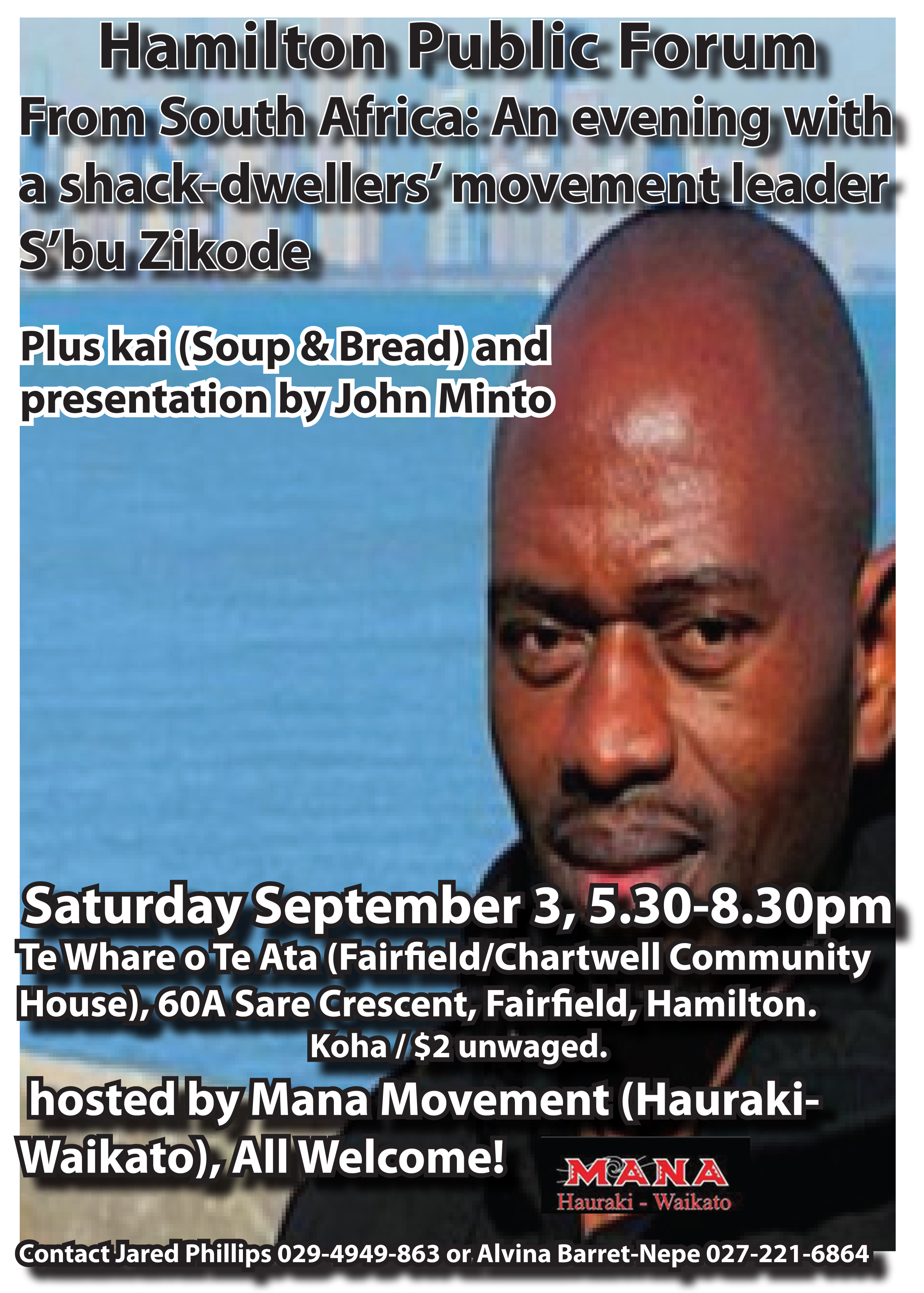On October 29 we reported on the current CMP meat industry lockout and fundraising efforts (see article here). We enourage all Auckland readers of this website to attend the upcoming fundraiser at Trades Hall, which appears to be organised by Socialist Aoteroa members and other progressives. We encourage all readers or sympathisers in Christchurch to join the picket against CMP at its head offices initiated by Occupy Christchurch.
The details of these events are below, slighlty adapted from the November 2 Global Peace and Justice Auckland newsletter. Donations are still encouraged and requested so please donate to Disputes Fund (name of account) 38-9007-0894028-08 (account number)
Auckland Fundraiser: 6pm, Friday, November 4, Trades Hall, 147 Great North Rd:
SOLIDARITY WITH LOCKED OUT MARTON WORKERS http://www.facebook.com/groups/211101752294033/ 6pm, Friday, November 4, Trades Hall, 147 Great North Rd, Auckland: Friday fundraiser for the locked out Marton Meat Workers: 6pm, Fri Nov 4, Trades Hall, 147 Great North Rd, Grey Lynn. Music from Lubin Rains (Vietnam War) and Caoimhe Macfehin (Drab Doo Riffs, Heart Attack Alley). Paul Brown, Scottish folk musician$10 donation on the door. All cash raised going to feed the families of the locked out meat workers. Don’t let them get starved back to work. http://socialistaotearoa.blogspot.com/2011/11/friday-fundraiser-for-locked-out-marton.html
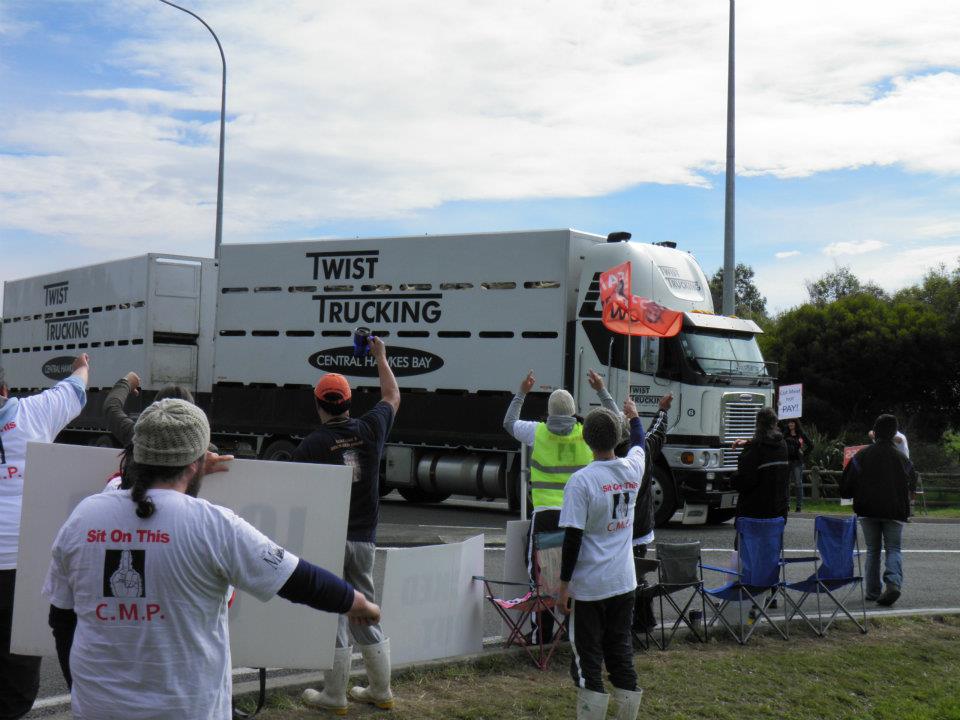
Christchurch – Picket CMP Head Office, 2pm, Saturday, March 5, 100 Carmen Rd:
(The following was part of a statement made by Occupy Christchurch)
At 2pm on Saturday 5th November Occupy Christchurch along with unions, workers campaign groups and local solidarity networks will take to the streets to bring some much needed attention to the plight of the 111 locked-out Canterbury Meat Packer workers. On Saturday 5th November, from 2pm ANZCO Foods Australasia & New Zealand Meat Marketing Office on 100 Carmen Rd will be the stage for an act of solidarity and opportunity to gather some much needed funding for those effected.
CMP is a subsidiary of the multinational corporation ANZCO which supplies New Zealand meat throughout the World. “For almost 2 weeks the unionised workforce at CMP’s Rangitikei’s lamb plant have been locked out by their bosses. Their crime? Not accepting up to a 30% pay cut and a significant decrease in hours.
The 111 workers and their families are now being starved out until they either accept the deal or with the support of the people of Aotearoa beat these disgusting acts of bad faith!” Stated Union Organiser and participant of Occupy Christchurch, Matt Jones. An urgent fund has been set up and money is beginning to pour in – “however with so many mouths to feed there is still a lot to do.” Continued Mr Jones.
“International pressure on this group will also be paramount for the future of our brothers and sisters in Rangitikei. Networking and campaigning in solidarity against big business who put profit before people and hold entire communities to ransom is something the Occupy Movement, combined with unions and the various workers rights campaign groups has the potential to smash and put into the history books ” Concluded Mr Jones. Occupy Christchurch has been based at South Hagley Park for more than two weeks. In support of the Occupy Wall Street phenomena the group hold open daily general assemblies, weekend ‘free markets’ and have been busy networking with community groups and organisations. More information on this picket and updates can be found at www.occupychristchurch.org.nz and by using the search term ‘occupy christchurch’ in Facebook.
November issue of The Spark
![]() Read the November issue here
Read the November issue here
At the end of this month New Zealand will hold a general election. While current polls might lead us to be cynical about voting, we need to remember that our right to vote was fought for by previous generations and shouldn’t be taken for granted. Woman gained the right to vote in this country though a massive popular movement in the latter part of the 19th century. We should be aware that Kate Sheppard believed “All that separates, whether of race, class, creed, or sex, is inhuman, and must be overcome” and saw the gaining women’s’ suffrage as part of that struggle.
We should also remember that in addition to women being denied the vote, there was a time when most men were too. Originally voting was a privilege reserved for land owning men, a democracy only for those who made up the capitalist class. In New Zealand in the 19th century, this excluded Maori who owned land in common, and most of the largely itinerant working class- miners, shearers, sailors- who often had no fixed abode, let alone their own land.
The right for working class men to vote in this part of the world was won by a rebellion of miners at the Eureka Stockade in Victoria, Australia in 1854. Fearing that a similar rebellion could take place on this side of the Tasman, the colonial government enacted Victoria’s suffrage laws, and working class men could now vote. Perhaps it’s fitting then that this issue of The Spark puts a focus on miners.
Marking the one year anniversary of the Pike River Mine disaster and the on-going official inquiry, we are publishing an abridged article from the International Federation of Chemical, Energy, Mine and General Workers Unions looking at the safety concerns at the mine. Labour historian Jared Davidson writes about the role miners have played in the New Zealand labour movement and we examine the position of the West Coast- a region largely dependent on mining- in the context of capitalism.
Also looked at this month is the Occupy Movement, which began in the US (though no doubt inspired by events that began in North Africa) and in October spread around the world. We print the press releases from the occupations taking place in New Zealand cities and an article from the Socialist Party of Australia, looking at the police repression of Occupy Melbourne. It seems a century and a half from Eureka those who right for democratic rights will still be met with state repression. Further coverage of the Occupy movement will appear in our next issue.
Elsewhere in these pages we cover the Rena Oil Spill, the New Zealand tour of S’bu Zikode, a leader of the shack dwellers movement in South Africa, the death of Steve Jobs, and the right to strike. The October issue, which features an article on each of the parliamentary parties as well as an article about the importance of retaining MMP in the referendum, will continue to be circulated between now and the election, and is available wherever you get The Spark.
– Byron Clark, November issue coordinating editor.
Smash the CMP lockout: Fund established, give money now!
Around 100 meat workers in Rangatikei – a provincial township in the Manawatu area – were locked out by Canterbury Meat Packers (CMP) ten days ago.
According to a CTU release the company is attempting to require the union (New Zealand Meat Workers Union) to sign up to a 20-30% wage decrease before any return to work. We also understand that the company is trying to disestablish the 35-hour week and increase the weekly hours of work per employee.
Traditionally the meat industry has contained a powerful section of the workers movement in New Zealand. Because of this the bosses have consciously attacked meat industry employment conditions over the past few decades. Generally the meat industry has been an area in which militant workers and some sections of the left have worked hard to extend and uphold conditions. The 35-hour week (which is particularly important in the meat industry given the physical demand of the work) is an example of these efforts.
The CMP bosses announced record profits last year. This is obviously a strategic attack. By maintaining the lockout they appear to be ‘digging in’.
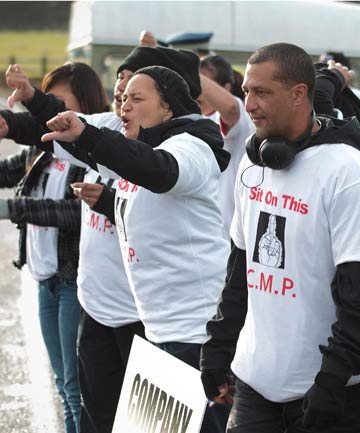
The bosses cannot be allowed to win as this would make a precedent for further attacks on the working class particularly in the meat industry.
Unions are encouraging local and Wellington people to attend the week-day picket line and give donations of food and supplies. Additional picket line infrastructure is also required such as trailers, gazebos, etc.
The CTU has set up a dispute fund for contributions. The account number is 38-9007-0894028-08.
Initially Workers Party has donated $200 and members will be collecting, including amongst dairy industry workers in Hamilton and at Occupy Wellington. We pledge to increase our donation to a modest $500 over the next few days. We also urge all New Zealand readers of this website who are in comfortable employment to donate the equivalent of one day’s pay.
Election series article # 8: Defend MMP in the 2011 referendum
This article by Jared Phillips first appeared in the June 2011 issue of The Spark.
This year New Zealand electors will vote in a national referendum, held as part of the general elections, asking them firstly to indicate whether they want to change from MMP, and secondly to indicate their preferred electoral system. The other options are First Past the Post (FPP), Preferential Voting (PV), Single Transferable Vote (STV), and Supplementary Member (SM). If a majority votes in favour of retaining MMP that decision will be binding. However, if a majority votes against retaining MMP, there will be a further referendum in 2014 whereby electors will decide between MMP and whichever alternative procedure gains the most support in the 2011 referendum. If a new system is selected in 2014 it will come into effect at the 2017 election.
Real advanced democracy can only be imposed and administered by the majority of working people through a workers‘ government. In the current period though, in which the working class has clearly not yet recovered organisationally or politically from the onslaught of neo-liberalism, it is important to ensure that the electoral system offering the most democratic electoral procedure prevails. From this point of view it is in the best interests of the working people and oppressed groups to retain MMP.
Continue reading “Election series article # 8: Defend MMP in the 2011 referendum”
Wellington Protest: Call for Action on Oil Spill!
The grounding of the Rena containter ship 20kms off the coast of Taurunga last Wednesday is having an environmental impact across the coastal area of the Bay of Plenty. The government itself has admitted that this is New Zealand’s worst maritime environmental disaster. We encourage all Welllington readers to head to the protest against the government’s response and against policies which put profits ahead of the environment.
When: Thursday October 13, 12pm-1pm
Where: Corner or Grey Street and Lambton Quay
Demands include:
– The immediate deployment of boons and oil scooping equipment around
the ship and around the trailing oil spill at sea – not toxic
dispersants of simple beach clean-ups
– An emergency system for dealing with the containers spilling toxic
waste
– An immediate moratorium on offshore drilling
All groups and individuals welcome, particularly affected iwi and communities. Please distribute this event information widely.
October issue of The Spark – expanded election issue
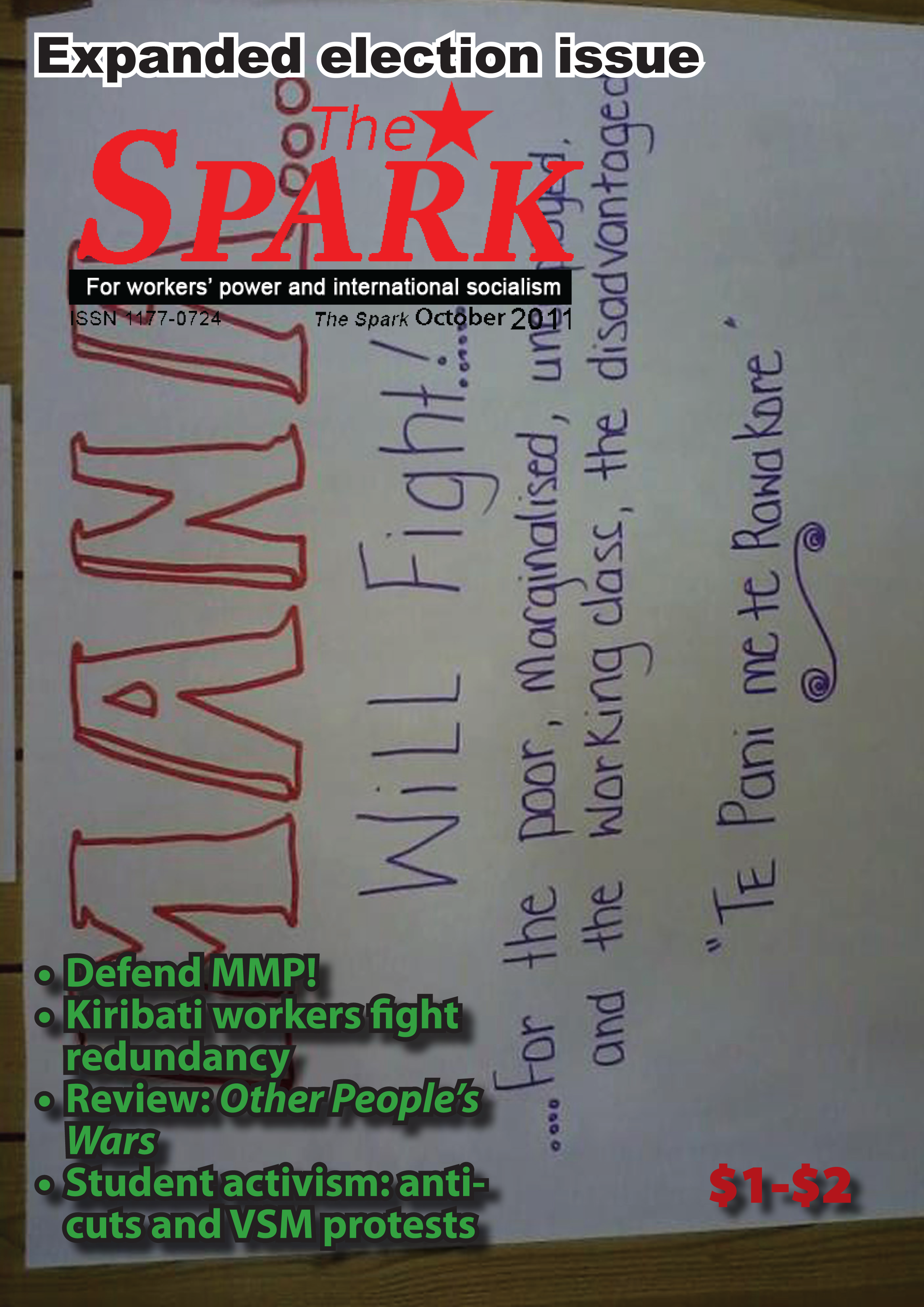 Read the October issue of The Spark here
Read the October issue of The Spark here
This month we present an expanded issue of The Spark which puts forward a socialist position on the upcoming general elections.*This starts with an assessment of the Mana Party project from a socialist point of view. In the following pages we have an assessment of other major parties which attempts to capture their current direction and articulate correct socialist strategies towards each of them. These are followed by a reprinted article from an earlier issue of The Spark which puts forward a pro-MMP position for the upcoming election. We also include material from both national days of student action against fee increases, cuts to courses, and voluntary student membership. In regards to issues of internationalism we cover some of the issues for international students, take a look at the plight of a group of fishermen who were stranded in New Zealand, and report on the struggle against redundancy by a group of Kiribati workers north of Auckland.
*The September issue of The Spark was foregone in order to prepare for this expanded issue which we will continue to circulate throughout the general elections.
The footage – five videos from students' national day of action
Students enter Hunter building
[youtube=http://www.youtube.com/watch?v=oDFeP51rMAU]
Up-close: Victoria University security hitting and pushing, hitting camera. Kassie Hartendorp, Workers Party branch organiser for Wellington on megaphone.
[youtube=http://www.youtube.com/watch?v=ZMb3oEM8-Jc]
Students against debt
[youtube=http://www.youtube.com/watch?v=F7NC9KVcYQs]
Vic and barricade/occupation in Auckland – TV3
Victoria University security again
[youtube=http://www.youtube.com/watch?v=jv_taIdlAMY]
For information on the day of action protests visit click here.
Kiribati workers, members of Northern AWUNZ, fight redundancies and racism in Warkworth
The press release below was issued today (7/9/11) by the Northern Amalgamated Workers Union which is in a redundancy dispute with Southern Paprika Limited. We note that the RSE policy is external to the union.
Media Release: Kiribati workers fight horticulture redundancies in Warkworth
For immediate publication
Workers at capsicum grower Southern Paprika Limited in Warkworth are being threatened with 13 redundancies, announced by the Company on Monday 5 September. The union on site, the Northern Amalgamated Workers Union has called for all the redundancies to be scrapped on the basis that no compelling justification has been put forward by SPL.
The Company admits that it is profitable, and that there is no financial case for the job cuts, citing instead “efficiencies”.
“At the same time as scrapping production jobs, the Company is proposing to create an additional HR position,” states union organiser Mike Kyriazopoulos. “How can getting rid of the people who pick, grade and pack the fruit, while making the company more top-heavy lead to greater efficiency?
Nearly all the workers come from Kiribati and Tuvalu, have put down roots in the local community, and will struggle to find alternative employment in the Warkworth area. The Company are proposing to bring in 16 temporary migrant workers under the Recognised Seasonal Employer (RSE) scheme in October.
“If a position is made redundant, only to be filled by an RSE worker, the Company risks violating its Agreement to Recruit under the RSE scheme,” says Kyriazopoulos. “Under RSE, they are required to ‘take all reasonable steps to recruit and train New Zealanders for available positions before trying to recruit non-New Zealand citizen or non resident workers.’ We will be taking this up at a political level.
“SPL claims that it is ‘carrying’ too many employees. But in the 12 years of its existence, the company has grown from 2.5 hectares to 14 hectares today, thanks to the efforts of its staff. It is the workers who have carried SPL on their shoulders.”
Notes:
- The union has challenged the ability of the company to run a fair process for redundancy after the manner in which it dealt with an incident involving a racist text on a company phone earlier in the year. A former Cadet Manager at SPL described the content of the text as being: “The best Christmas present I could have would be a black man swinging from a tree”.
No-one responsible for the text message was disciplined in the subsequent investigation by the company. However, two union members were disciplined for trying to conduct their own investigation into the incident. The union has referred the matter to the Human Rights Commission.
For further information, contact Mike Kyriazopoulos on 021 288 5601 or michael@awunz.org.nz
‘Other People’s Wars’: Real journalism exposing NZ imperialism
Joel Cosgrove, Workers Party, Wellington
Anyone who reads the book will know more about New Zealand military and what it did in Afghanistan, Iraq and the Gulf than any politician in parliament – Nicky Hager.
With his latest book Nicky Hager has blown away the tightly controlled political and military cover for New Zealand’s involvement in Afghanistan and Iraq. The book itself was published on Thursday and once it has been read and analysed The Spark will publish a wider analysis drawn from Hager’s explosive scoop. 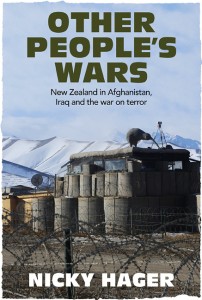
With his previous books ‘Secret Power’, ‘Secrets and Lies’, ‘Seeds of Distrust’, ‘The Hollow Men’ and now ‘Other People’s Wars’ Hager has cemented his place as one of the most important journalists New Zealand has ever produced.
The following is a summary of the key points that Hager makes in his book:
• One of the major themes running throughout the book is the control the military have exerted over the media through public relations methods. Leaked documents show the strategies hatched by the military leadership to keep key events and information from parliament, the media, and the public.
• Right from New Zealand’s first involvement in Afghanistan, confidential critical reports have circulated amongst the defence force concerning the lack of strategy regarding New Zealand involvement in imperialist wars, as well as tactical deficiencies with regard to the New Zealand deployments.
• Primarily New Zealand’s involvement in Afghanistan and Iraq has been motivated by diplomatic, defence, and trade concerns.
• New Zealand’s involvement in the wars has been driven and led by defence staff, with a strong focus on rebuilding what is in effect the ANZUS alliance in all but name.
• Officials and military staff developed a close and tight reign on any negative information coming out of the warzones, they resorted to misleading or outright lying to get a good story.
• New Zealand troops have regularly engaged in combat activity or combat support. This activity was not confined to the SAS.
• New Zealand Navy frigates and Air Force Orions’ were actively involved in supporting the US/UK invasion of Iraq.
• New Zealand’s ‘reconstruction’ efforts in Bamiyan province were at best a fig-leaf and at worst an outright sham. Reconstruction projects were started afresh every 6 months and then left on the wayside with the end of each deployment. The successes hyped up in New Zealand were extremely over-exaggerated or downright lies.
• There were undeclared US intelligence officers in the Kiwi base at Bamiyan who would often debrief New Zealand soldiers directly. New Zealand media were aware of their presence but as a whole, did not report on it, due to the perceived ‘irrelevance’ of raising it.
• Hager has described this as the biggest leak in New Zealand history.
The response to this at Hager’s press conference and afterwards by the media and senior politicians has been illustrative. Guyon Espiner (TVONE political editor) stated that he was not surprised that U.S. intelligence officers were present in the New Zealand Provincial Reconstruction Team base and that he even ate meals with them and was briefed, pledging to keep information secret. He then proceeded to ask Hager if he had gone to Afghanistan, which Hager has not. However Hager’s 1300+ footnotes representing five years of research and interviews has far more authenticity and accuracy when measured against the public relations-parachute-reporting that has characterised the majority of the New Zealand media’s reporting of Afghanistan to date.
Vernon Small in a recent Dominion opinion piece was surprisingly frank when he said that: “In fact, I, and other reporters before me, were introduced to US intelligence and communications staff at Bamiyan and at other Kiwi bases and ate and chatted with them. The stars and stripes flies alongside the New Zealand flag at Bamiyan to advertise the US contingent.”
John Key’s response has been to roll his eyes, rubbish the work on the grounds of its authorship by Hager and state blankly that although he has not read the work, there is no evidence to back up Hager’s claims. This has been an almost carbon copy to his dismissal of Jon Stephenson who is the only other major New Zealand journalist writing independently and critically about New Zealand’s involvement in Afghanistan. The only major difference between Key’s treatment of either journalist is the malice and personal attacks poured on Stephenson.
Phil Goff’s response has not been much better. Refusing to call for an inquiry and describing the book as ‘spurious’, again without reading it. The general response so far from media has been to focus almost entirely on the revelation of the presence of U.S. intelligence officials in the Bamiyan camp, normalising and downplaying the fact by revealing a general knowledge of their presence, justifying it through the nonchalant shrugging of their shoulders at the apparent lack of need to report this to the general public.
Jerry Mateparae, the recent head of the Defence Force, who officially took up the role Governor General on the day of the book’s release, has denied or been unable to recall any of the issues raised in the book. Simon Wilson writing in the Metro (before the publication of the book) wrote, “Mateparae is a former head of the SAS, the Army and the NZDF, and has therefore been responsible, in one capacity or another, for the troops in the field and for advising the government on their activities, for the entire period of the Afghan war.”

This is an aspect that Hager has talked about. Either senior parliamentarians in both the Labour and National governments lied, or they chose not to know about what was going, or both. The denials by both military and parliamentary figures have been clear to say they did not know about CIA bases. Not that there were not bases, or that they were staffed by intelligence figures, just a very specific, very vague wave-off, that relies on Hager not being able to provide documentation that directly links any of these senior figures to the issues raised. Key himself has been clear to talk about the lack of a “smoking gun” in relation to Hager’s claims.
One of the leaks is a confidential 2010 Defence Force report which said the projects overseen by the Provincial Reconstruction Team “…do not appear to be sustainable in any way”. This is a key aspect behind the change in presentation of New Zealand’s support for imperialist interventions. We are ‘peacekeepers’ who are ‘rebuilding’ in occupied lands, from Bosnia, to East Timor and now Afghanistan and Iraq. The language of intervention, invasion, and occupation has changed and been softened to hide away the realities of New Zealand’s support of American invasions which have killed hundreds of thousands of lives over the past decade. Hager’s meticulous documentation deals a striking blow to this notion. New Zealand’s involvement in Afghanistan is about closer ties to the U.S., it is not about ‘hearts and minds’ or provincial reconstruction, it is about providing intelligence and support for the US bombing and indiscriminate attacks on the Afghan people. When they say that the SAS are ‘mentoring’ Afghan troops it is now clear – even though it was obvious before – that it means being at the front of any attacks or operations, not unlike U.S. ‘observers’ in the Vietnam war.
Fran O’Sullivan, in The New Zealand Herald, wrote that there exists “…a culture of secrecy which means New Zealand journalists can obtain clearer information from military websites overseas than is made readily available at home” and said “… much of the official information which the Labour government chose to publish was hopelessly outdated.”
This is the other important aspect of the story which Hager hasn’t engaged on to the same extent. Namely the co-option of the media (as if they weren’t already coopted to begin with). Every journalist who has spoken of their trips to Afghanistan since the publication of Hager’s book has done so as a defence of the establishment and as an attack on Hager’s credibility. None of them thought that the presence of U.S. intelligence officials camped within the New Zealand base was at all at odds with the ‘peacekeeping’, ‘reconstruction’ public face of the mission. The reality is that the media are no longer reporting on the military but instead reporting for the military.
In part the reason for this is that as mainstream journalists, they are reliant on the government and dominant political parties for stories, gossip, and scoops. If they break this system of patronage, then they lose their place in the food-chain.
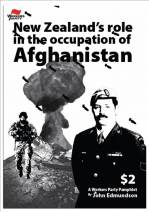
While various governments have not been able to cow either Stephenson or Hager, both journalists stand as a testament to the ostracisation involved when actually holding power to account. The role of people like Richard Long, who moved from Evening Post editorship to being chief of staff to then National Party leader Don Brash as well as the tight links between media, business and the political sphere shown by the fallout from the News of the World scandal in England makes this symbiotic relationship clear.
Since 2001, the Workers Party and its forerunner organisations have joined in the calls and the marches against the war and New Zealand’s involvement, and on occasions the Workers Party has played key organisational and/or political roles in that movement. Clearly Hagar has outlined how the political parties and senior military figures have learnt and developed their public relations strategies and tactics. We need to learn from this in order to counteract government propaganda and whatever other public relations approaches they attempt next.
Links:
Stephen Price is a media lawyer and advisor to Hager, who has written from his perspective on the book and the issues raised.
http://www.medialawjournal.co.nz/?p=498
Selwyn Manning (Scoop Editor) in an interview on the matter on 95BfM as well as an outline of the book/issues itself
http://www.scoop.co.nz/stories/HL1109/S00006/manning-hagers-new-book-new-gov-general-controversies.htm
Audrey Young provides an outline of the story so far from her perspective
http://www.nzherald.co.nz/audrey-young/news/article.cfm?a_id=164&objectid=10748912
Nicky Hager’s press release announcing the publication and release of the book.
http://www.scoop.co.nz/stories/PO1109/S00013/release-of-nicky-hagers-new-book-other-peoples-wars.htm
Journalist Keith Ng focuses on the role in the media, as well as an interesting discussion within the comments section.
http://publicaddress.net/onpoint/other-peoples-wars/
A confrontational interview with Nicky Hager on TV3
http://www.scoop.co.nz/multimedia/tv/national/55767.html
An outline of the press conference and an audio recording of the Q&A after Hager outlined the general issues raised.
http://www.scoop.co.nz/stories/HL1109/S00007/images-audio-nicky-hagers-new-book-other-peoples-wars.htm
Dominion Post Political Editor Vernon Small plays down Hager’s claims and distracts from the core issues raised.
http://www.stuff.co.nz/national/politics/5551660/Little-kept-from-media-eyes-at-base
Zetetic on the Standard focuses on the drivers behind the media herd mentality.
http://thestandard.org.nz/need-to-know/
Summary of the varied responses to Hager’s book
http://www.scoop.co.nz/stories/HL1109/S00010/rnz-audio-reaction-to-new-nicky-hager-book.htm
Gordon Campbell opines on the book and the controversy surrounding it, as well as a video of the press conference.
http://gordoncampbell.scoop.co.nz/2011/09/02/gordon-campbell-on-nicky-hager%E2%80%99s-new-book/


